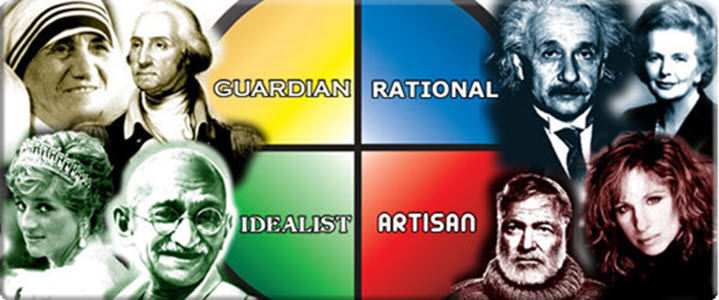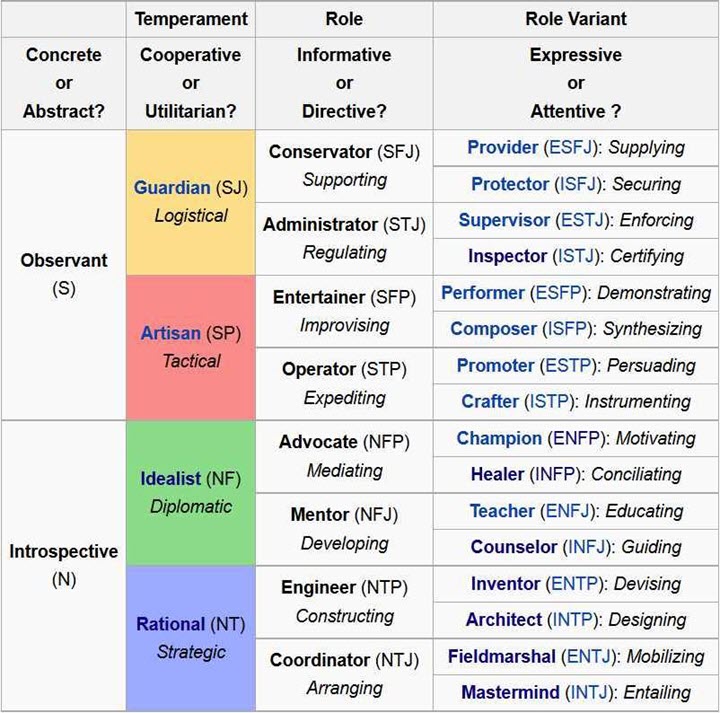
To Dr. David Keirsy, Temperament is a configuration of observable personality traits, such as communication habits, patterns of action, and sets of characteristic attitudes, values, and talents.
This encompasses personal needs and contributions individuals make in the workplace and the roles they play in society. Each temperament has its unique qualities and shortcomings, strengths, and challenges.
Keirsey vs. MBTI
Myers-Briggs and the Jungian theory focus on the cognitive functions we use to learn and evaluate the information for making decisions.
There are four learning functions (called "perceiving processes) and four decision-making functions (called "judging processes").
Depending upon your Myers-Briggs type, you will have one of the learning processes and one of the decision-making processes as your favorite.
MBTI measures two orientations Introversion vs. Extroversion and Judging vs. Perceiving.
And measures four psychological functions Sensing vs. iNtuition and Thinking vs. Feeling.
The learning processes are based on the Sensor/iNtuitive, with each having an extraverted and an introverted expression version:
- Introverted Sensing
- Extraverted Sensing
- Introverted iNtuition
- Extraverted iNtuition
The decision-making processes are based on the Thinker/Feeler, and they also have an introverted and an extraverted expression:
- Introverted Feeling
- Extraverted Feeling
- Introverted Thinking
- Extraverted Thinking
On the other hand, Keirsey focused primarily on the Concrete vs. Abstract.
Behavior, shown by the Sensing / Intuiting pair, mattered more to him.
In the Keirsey Four Temperament model, there is no mention of cognitive functions.
Keirsey used the same letters as Myers-Briggs, but he used the letters to sort between individual preferences.
Concrete / Abstract
- S - Sensing (Observant)
- N - Intuiting (Introspective)
Temperaments
- T - Thinking
- F - Feeling
Roles
- P - Perceiving
- J - Judging
Role Variants
- E - Extraversion (Expressive)
- I - Introversion (Attentive)
Keirsey felt that Sensing types are usually "concrete" in their approach.
They concern themselves with things they can see, hear, feel, taste, and smell.
And he thought that the Intuitive types focused on something they could imagine or things that could be.
Keirsey paired Sensing with Judging and Perceiving (SJ and SP) and Intuition with Thinking and Feeling (NF and NT), forming the four temperament types.

SJ (Sensing / Judging) - The Guardians
- The Guardian temperament shares a love of the concrete with the Artisans. However, Guardians' behavior is more organized than intuitive.
- They seek security.
- They have an excellent desire for belonging.
- Duty and responsibility are essential to a Guardian.
- They're best at logistics.
- They're great organizers, checkers, and facilitators and very supportive of others.
- Generally, they are more left-side brain dominant, conservative black-and-white thinkers who prefer things remain safe, secure, and the same.
The Matching MBTI Types
- Provider (ESFJ), who is a conservator, best at supporting and supplying.
- Protector (ISFJ), a conservator, is great at supporting and securing.
- Supervisor (ESTJ) who is an administrator, best at regulating and enforcing.
- Inspector (ISTJ), an administrator, is best at regulating and certifying.
They're accountants, CFOs, military, and police — they love details, and they're all about safety and security.
When you're dealing with an SJ in business, they're very conservative and slow to accept new ideas because they're risky.
While you want to talk about social media marketing, they still glare suspiciously at their fax machine.
They don't want revolutionary thinking when you're interviewing for a job.
They want to know you'll maintain the status quo.
SP (Sensing / Perceiving) - The Artisans
- The Artisan temperament is defined by adaptability and a tendency to favor concrete action.
- They want stimulation.
- They strive to be virtuosos.
- They want to make an impact in their world.
- They're strong tacticians who excel at troubleshooting and using tools, instruments, and equipment.
- Their mental agility increases their ability to adapt to changing environments.
- They're creators, and they love change and new situations
- Artisans generally are right-brain dominant.
- The SJs and SPs each comprise 38% of the population.
The Matching MBTI Types
- Performer (ESFP) is an entertainer proficient at improvising and excels in demonstrating.
- Composer (ISFP), who is a performer, a great improviser, and excels at synthesizing.
- Promoter (ESTP), an operator, best at expediting and persuading others.
- Crafter (ISTP) is an operator who excels at expediting and using instruments.
They're artists, musicians, writers, and other creative types.
They're very flighty, and they hate details.
These people will get started on a project and abandon it three weeks later because they found an exciting new project.
If you're trying to discuss in-depth why they need to implement a 10-step customer tracking process for their company, know that their eyes glazed over as soon as you said "10 steps."
NT (Intuitive / Thinking) - The Rationals
- The Rational temperament prefers abstraction like Idealists, but they are more concerned with objectivity.
- They aim for self-control.
- What matters to them is knowledge and competence.
- They want to be good at their work and achieve mastery without being pushed.
- They're great at strategy and excel in tasks that involve engineering, theorizing, coordinating, and developing concepts.
- They love details, are very analytical, and pursue knowledge for knowledge's sake.
- Generally, they are more analytical or left-side brain dominant.
The Matching MBTI Types
- Inventor (ENTP), an engineer who excels in constructing and devising.
- Architect (INTP), an engineer who is excellent at constructing and designing.
- Field Marshall (ENTJ), a coordinator who is good at arranging and mobilizing.
- Mastermind (INTJ), a coordinator who is best at arranging and entailing.
These people also love details and are very analytical but pursue knowledge for knowledge's sake.
They'll want to know lots and lots of details about your project, but they're just as interested in knowledge's sake as in making a decision.
You may see these people in a sales support role, tracking sales performance, monitoring and managing databases, and anything involving data processing.
NF (Intuitive / Feeling) - The Idealists
- Idealists, of course, prefer the abstract to the concrete.
- What's most important to them is meaning and significance.
- They seek their true identity and strive towards personal growth.
- At the same time, they're very compassionate.
- Their greatest natural ability is in diplomacy.
- An idealist is the best choice if you need someone to clarify, unify, or inspire.
- The Idealists. Interested in changing the world and making life better for others.
- Idealists generally are right-brain dominate.
- NTs and NPs each make up 12% of the rest of the population.
The Matching MBTI Types
- Champion (ENFP), an advocate who is best at mediating and motivating.
- Healer (INFP), an advocate who excels in mediating and conciliating.
- Teacher (ENFJ), a mentor who does best in developing and educating.
- Counselor (INFJ), a mentor who is best at developing and guiding.
Idealists are a good fit in the helping professions — nurses, social workers, and nonprofit employees.
They're more interested in improving lives and changing the world.
They're more sympathetic to the Artisans, while the Thinkers hang out with the Guardians.